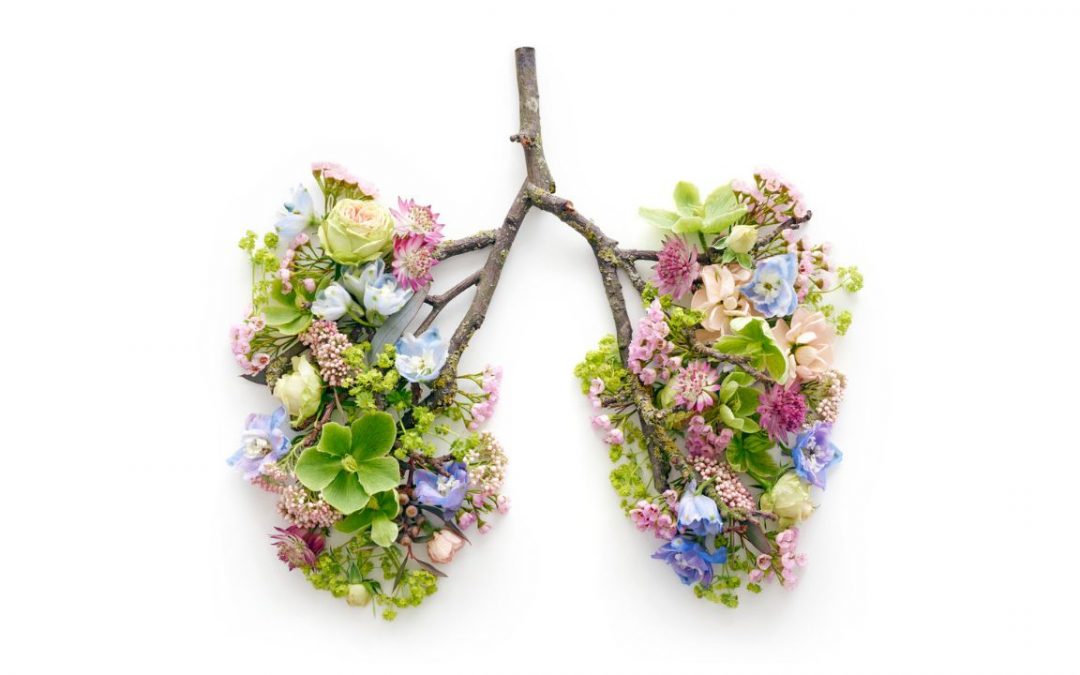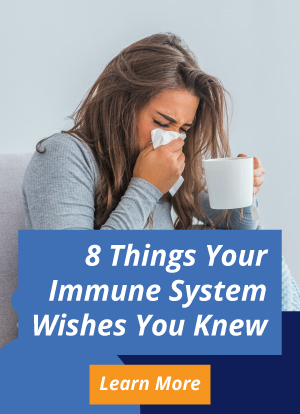Spring is often characterized as a season of renewal, hope, and rebirth. However, for many, it’s also a season of runny noses, itchy and watery eyes. In fact, about 25% of North Americans suffer from seasonal allergies, with the spring season being the biggest offender.
Spring allergies typically happen when your immune system detects a substance, often pollen, as something dangerous and mounts a defensive response by releasing histamines. Histamines spring into action to try to rid your body of that substance, but the results are annoying symptoms like:
- Sneezing
- Watery eyes
- Coughs
- Runny noses
- Headaches
- Scratchy throats
- Congested ears
- Fatigue
Birch pollen is a common trigger in the spring, as well as cedar, willow and poplar pollen.
Many people also experience reactions indoors that are triggered by dust, mold, or pet dander.
You might also wonder why some people develop allergies, while others sail through spring unscathed? It’s likely a combination of genetics, physiology, and environment. You’re also more likely to have allergies if you have asthma.
Let’s take a deep dive into some strategies for combating spring allergies the natural way.
Natural Allergy Solutions and Home Remedies
1 – Keep a clean, allergy-free environment
It goes without saying that if your allergies are triggered by dust or mold, you should keep a clean home. You also want to be sure you’re eliminating any grass or pollen you’ve tracked in. Some people find they have to wear an N-95 mask when they clean because of the dust they stir up. Using a vacuum with a HEPA filter and using a HEPA air filter can help keep your home allergen-free.
2 – Switch to natural cleaning products
An often-overlooked risk of cleaning the home is reactions to cleaning products. Many commonly used products contain chemicals that have been shown to damage lung function. Many studies have found several harmful effects from commercial cleaning agents, and conclude that household products like vinegar, soap, water, vinegar, and baking soda can accomplish as much as their more harmful counterparts.
Here’s a simple recipe for an all-purpose natural home cleaning solution:
1 cup white vinegar
1 cup water
10-15 drops of your favorite essential oil (optional)
Instructions:
In a spray bottle, mix together the white vinegar and water. If desired, add 10-15 drops of your favorite essential oil. Tea tree oil, lavender oil, and lemon oil are all great options for their antibacterial and antifungal properties. Shake well to mix all the ingredients together. If you have pets, please don’t add essential oils to clean.
Use the natural cleaning solution to clean and disinfect surfaces throughout your home. Simply spray the solution on the surface and wipe clean with a cloth.
This natural cleaning solution is safe, effective, and free of harmful chemicals found in many commercial cleaning products. Plus, the addition of essential oils can leave your home smelling fresh and clean!
3 – Herbal remedies
Here are a few herbal supplements that are known to help with allergy relief:
- Butterbur: This herb has been used for centuries to treat allergies and asthma. It contains natural antihistamines, which can help reduce inflammation and alleviate symptoms such as sneezing, itching, and congestion.
- Stinging nettle: This herb is a natural antihistamine and anti-inflammatory. It can be taken in supplement form or made into a tea to help relieve allergy symptoms such as sneezing, itching, and congestion.
- Licorice root: This herb has natural anti-inflammatory and anti-allergic properties. It can be taken as a supplement or made into a tea to help relieve symptoms such as coughing and sore throat associated with allergies. Please do not use if you have high blood pressure.
- Ginger: This root has natural anti-inflammatory properties that can help reduce allergy symptoms such as nasal congestion and itchy eyes. It can be taken in supplement form or added to food and drinks as a spice.
As with any herbal supplement, it’s important to talk to your healthcare provider before taking them, especially if you have any medical conditions or take other medications.
4 – Saline nasal irrigation
Flushing your nasal passages with saline water can ease allergy symptoms. Be sure to use saline water, not salt water, and work with clean tools.
5 – Essential oils for allergy relief
There are several ways to reap the benefits of essential oils in allergy treatment. Note, however, that some people are allergic to certain oils, so start slowly and make notes on how you feel with each one you try. You can use a diffuser, dab some diluted oil behind your ears, spray diluted oil into the air, or simply breathe in their scent right from the container. Effective oils include:
- Lavender, which works by reducing inflammation in the nasal passages. Try adding some to a warm bath!
- Eucalyptus, which also helps inflamed nasal passages. You’ll notice a welcome cooling sensation when you breathe it in.
- Peppermint also has anti-inflammatory properties
- Frankincense has been used for centuries to reduce asthma and respiratory symptoms.
6 – Probiotics
Probiotics help maintain a good balance of bacteria in your gut, which in turn supports your immune system. Talk with your healthcare practitioner about the right probiotics for you. Eating fermented foods like tempeh, kefir, kimchi and sauerkraut can also help maintain a healthy biome in your gut.
7 – Good nutrition
A well-rounded diet centered on whole foods helps your immune system and overall well-being. To help combat allergies, be sure to include:
- Plenty of vitamin C, which can reduce your histamine levels.
- Foods high in omega-3 fatty acids, like nuts and fatty fish, which fight inflammation
- Food that contains bromelain, such as pineapple and mangos. Bromelain has been shown to reduce allergy symptoms.
- Foods high in quercetin, which inhibits histamine production. Good sources of quercetin include broccoli and cauliflower.
It’s also important to pay attention to any foods that cause an allergic reaction or exacerbate other allergies. When you’re experiencing allergy symptoms, keep a detailed diary of anything you consume to help narrow the cause.
8 – Acupuncture
According to traditional Chinese medicine, allergies are caused by an imbalance in the body’s energy flow or “qi”. Acupuncture helps to rebalance this energy and boost the immune system, leading to a reduction in allergy symptoms. Additionally, acupuncture is a safe and drug-free option for those looking for natural solutions to allergy relief.
9 – Exercise
Exercise can increase circulation in your lungs and nasal passages, which can help with congestion and drainage. However, exercising outdoors can trigger seasonal allergies, so you may have to stick to indoor workouts for the season. Alternatively, stick to morning or evening activities which often carry the smallest risk since the dew can weigh down pollen. And, be sure to shower and wash your clothes after exercising outdoors, since you may be carrying pollen!
SOURCES
Centers for Disease Control and Prevention, “Allergies” https://www.cdc.gov/nchs/fastats/allergies.htm
Dave ND, Xiang L, Rehm KE, Marshall GD Jr. Stress and allergic diseases. Immunol Allergy Clin North Am. 2011 Feb;31(1):55-68. doi: 10.1016/j.iac.2010.09.009. PMID: 21094923; PMCID: PMC3264048.
Svanes Ø, Bertelsen RJ, Lygre SHL, Carsin AE, Antó JM, Forsberg B, García-García JM, Gullón JA, Heinrich J, Holm M, Kogevinas M, Urrutia I, Leynaert B, Moratalla JM, Le Moual N, Lytras T, Norbäck D, Nowak D, Olivieri M, Pin I, Probst-Hensch N, Schlünssen V, Sigsgaard T, Skorge TD, Villani S, Jarvis D, Zock JP, Svanes C. Cleaning at Home and at Work in Relation to Lung Function Decline and Airway Obstruction. Am J Respir Crit Care Med. 2018 May 1;197(9):1157-1163. doi: 10.1164/rccm.201706-1311OC. PMID: 29451393.
Copy
International Journal of Novel Research in Life Sciences Vol. 2, Issue 2, pp: (31-38), Month: March – April 2015, Available at: www.noveltyjournals.com Page | 31 Novelty Journals Health Issues and Environmental Impact of Cleaning Agents Sabharwal, Jyotie Department of Botany; Khalsa College For Women, Civil Lines, Ludhiana-141002, Indi
Changes in Latina Women’s Exposure to Cleaning Chemicals Associated with Switching from Conventional to “Green” HousehPark KH, Sim DW, Lee SC, Moon S, Choe E, Shin H, Kim SR, Lee JH, Park HH, Huh D, Park JW. Effects of Air Purifiers on Patients with Allergic Rhinitis: a Multicenter, Randomized, Double-Blind, and Placebo-Controlled Study. Yonsei Med J. 2020 Aug;61(8):689-697. doi: 10.3349/ymj.2020.61.8.689. PMID: 32734732; PMCID: PMC7393300.old Cleaning Products: The LUCIR Intervention Study
Hermelingmeier KE, Weber RK, Hellmich M, Heubach CP, Mösges R. Nasal irrigation as an adjunctive treatment in allergic rhinitis: a systematic review and meta-analysis. Am J Rhinol Allergy. 2012 Sep-Oct;26(5):e119-25. doi: 10.2500/ajra.2012.26.3787. PMID: 23168142; PMCID: PMC3904042.
Kim G. Harley, Lucia Calderon, James E.S. Nolan, Randy Maddalena, Marion Russell, Katherine Roman, Stephanie Mayo-Burgos, Jessica Cabrera, Norma Morga, and Asa Bradman
Published:1 September 2021CID: 097001https://doi.org/10.1289/EHP8831Cited by:6
Bielory L, Heimall J. Review of complementary and alternative medicine in treatment of ocular allergies. Curr Opin Allergy Clin Immunol. 2003 Oct;3(5):395-9. doi: 10.1097/00130832-200310000-00013. PMID: 14501441.
Bielory L, Heimall J. Review of complementary and alternative medicine in treatment of ocular allergies. Curr Opin Allergy Clin Immunol. 2003 Oct;3(5):395-9. doi: 10.1097/00130832-200310000-00013. PMID: 14501441.
Ueno-Iio T, Shibakura M, Yokota K, Aoe M, Hyoda T, Shinohata R, Kanehiro A, Tanimoto M, Kataoka M. Lavender essential oil inhalation suppresses allergic airway inflammation and mucous cell hyperplasia in a murine model of asthma. Life Sci. 2014 Jul 17;108(2):109-15. doi: 10.1016/j.lfs.2014.05.018. Epub 2014 Jun 5. PMID: 24909715.
Common spring allergies, causes and symptoms
Liu Z, Liu X, Sang L, Liu H, Xu Q, Liu Z. Boswellic acid attenuates asthma phenotypes by downregulation of GATA3 via pSTAT6 inhibition in a murine model of asthma. Int J Clin Exp Pathol. 2015 Jan 1;8(1):236-43. PMID: 25755710; PMCID: PMC4348891.
Zajac AE, Adams AS, Turner JH. A systematic review and meta-analysis of probiotics for the treatment of allergic rhinitis. Int Forum Allergy Rhinol. 2015 Jun;5(6):524-32. doi: 10.1002/alr.21492. Epub 2015 Apr 20. PMID: 25899251; PMCID: PMC4725706.
Secor ER Jr, Szczepanek SM, Castater CA, Adami AJ, Matson AP, Rafti ET, Guernsey L, Natarajan P, McNamara JT, Schramm CM, Thrall RS, Silbart LK. Bromelain Inhibits Allergic Sensitization and Murine Asthma via Modulation of Dendritic Cells. Evid Based Complement Alternat Med. 2013;2013:702196. doi: 10.1155/2013/702196. Epub 2013 Dec 5. PMID: 24381635; PMCID: PMC3870104.
Mlcek J, Jurikova T, Skrovankova S, Sochor J. Quercetin and Its Anti-Allergic Immune Response. Molecules. 2016 May 12;21(5):623. doi: 10.3390/molecules21050623. PMID: 27187333; PMCID: PMC6273625.
He M, Qin W, Qin Z, Zhao C. Acupuncture for allergic rhinitis: a systematic review and meta-analysis. Eur J Med Res. 2022 Apr 25;27(1):58. doi: 10.1186/s40001-022-00682-3. PMID: 35462555; PMCID: PMC9036742.



